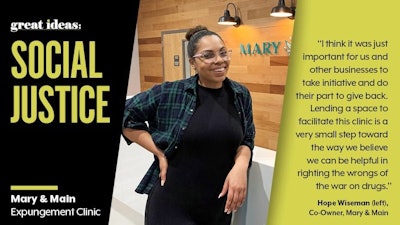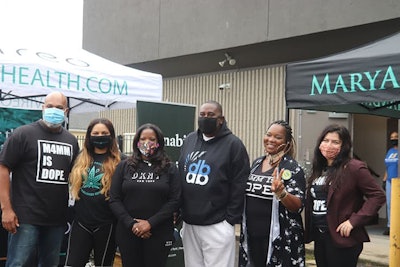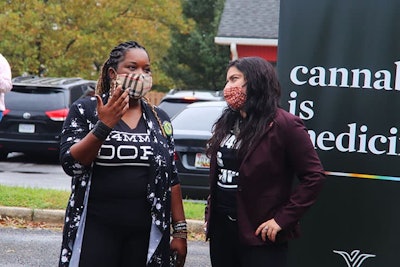
Mary & Main, Vireo Health and Minorities for Medical Marijuana (M4MM) came together to offer a free expungement clinic at Mary & Main’s dispensary in Capitol Heights, Md., on Sept. 26 to help the local community clear eligible cannabis convictions from their criminal records.
Aisha Braveboy, state’s attorney for Prince George’s County, and Maryland State Delegate and Maryland Legislative Black Caucus Chairman Darryl Barnes (District 25) were also in attendance, as well as 10 local attorneys who were on-site to offer personalized advice to attendees.
In some ways, the event was an extension of M4MM’s Project Clean Slate program, which provides education in various states on how to expunge past convictions for minor cannabis possession offenses.
“It was an idea of wanting to do something to really capitalize on the fact that we’re still seeing more black and brown people being arrested for cannabis,” M4MM Executive Director, CEO and Founder Roz McCarthy said. “Hope Wiseman … [is] our state director for our chapter in Maryland. She has a beautiful space that could accommodate us [during the] COVID-19 [pandemic]. … We just brought our minds together and made it happen.”

In addition to cannabis convictions, attendees could also clear any eligible misdemeanor charge from their records at the event, which was held from 11 a.m. to 5 p.m. ET in the upstairs of Mary & Main’s dispensary as part of the company’s two-year anniversary celebration.
The dispensary offered specials and deals during the event, as well as voter registration, free HIV testing, a DJ and more, although, Mary & Main co-owner Hope Wiseman said, “The clinic was definitely the star of the show.”
“This year, we thought it was really important to make sure our two-year anniversary was focused on our local community and the needs of our local community,” she said, adding that Capitol Heights leads Prince George’s County in HIV cases, and many community members have also been impacted by past cannabis convictions, which affect their access to jobs and public assistance.
“For us, as a black- and women-owned business in this local community where we know people have been disproportionately affected, we thought it was very important to … offer these services for free because we know a lot of times, attorneys charge between $1,000 to $3,000 to work on these types of cases,” Wiseman said. “We wanted to be able to offer these services for free to our community. … We wanted to do our part.”
Dr. Paloma Lehfeldt, director of medical education for Vireo Health, one of Mary & Main’s dispensary partners, lent her assistance to the event, which she saw as a way to give back to those most affected by the war on drugs.
“The bottom line with expungement is that we want to right the wrong that was done by the so-called war on drugs,” she said. “We call it the so-called war on drugs because it wasn’t a war on the plant or cannabis. It was a war on black and brown communities. … It’s impossible to be a part of this business without really engaging in the diversity, equity and inclusion aspect of it.”

About 400 people attended Mary & Main’s anniversary celebration, and the expungement clinic saw more than 30 people, who provided positive feedback on the event.
“We had a lot of people there, [and] we got to speak to a lot more people who may not have been eligible or who may not have been ready that day to engage with one of the attorneys,” Wiseman said. “I think we did a really good job of educating our community on expungement as well as actually completing some.”
“The amount of people I saw beaming while walking out of the clinic was amazing,” Lehfeldt added. “The attorneys that were on site really are passionate about this.”
No one was turned away and wait times were kept to a minimum, McCarthy added, and the attorneys were able to spend the time they needed with each person to go through their specific cases.
“We got to help people who deserved it,” McCarthy said.
McCarthy and Lehfeldt both point to the same young woman as their favorite success story of the day. The woman, now in her early 20s, was charged with possession when she was 16, when law enforcement was called to investigate the smell of cannabis smoke, despite not having any cannabis or paraphernalia on her at the time.
“Sometimes, it’s a shame that you carry,” McCarthy said. “I talked to one gentleman, and he was embarrassed. He was like, ‘I did this 15 years ago and it’s still sitting there. It’s like a scarlet letter.’ … I think the industry has a responsibility … to go back and see these things that happened during the war on drugs era and the communities that were targeted. … I think the industry is really starting to digest the importance of this social give back, and I’m just happy to be a part of it.”
From Wiseman’s experience, many people don’t realize that their specific conviction is eligible for expungement, or they might think that charges were dropped and that they are off their record, when that isn’t the case.
The benefits of the expungement clinic were two-fold, then, according to Wiseman—first, it brought overall awareness to the local community, and it also provided access to attorneys for people who might not be able to otherwise afford legal counsel to get their records expunged.
“I think it was just important for us and other businesses to take initiative and do their part to give back,” Wiseman said. “Lending a space to facilitate this clinic is a very small step toward the way we believe we can be helpful in righting the wrongs of the war on drugs.”
“Being able to be in the cannabis business and give back to these communities is invaluable and much needed, and it’s unfortunate that it’s taken this long to bring this forth to the communities, especially black and brown communities,” Lehfeldt added.
McCarthy hopes to use the Maryland event as a model for expungement clinics in other states. M4MM has 27 chapters throughout the country, and many of the directors are looking forward to replicating the event in their own communities.
“This is not our last stop,” McCarthy said. “This is a commitment. We have to continue this, build upon it and take this model … to different states … to support those individuals who basically feel at a loss. We just want to help out and we want to make a difference.”
“People don’t even know that expungement is an option, so this is something we’ll be screaming from the rafters from now on after seeing so many people affected during an event that we had for one day,” Lehfeldt added. “We’re going to continue the momentum. If we can expunge one person’s record, this is worth it."

























